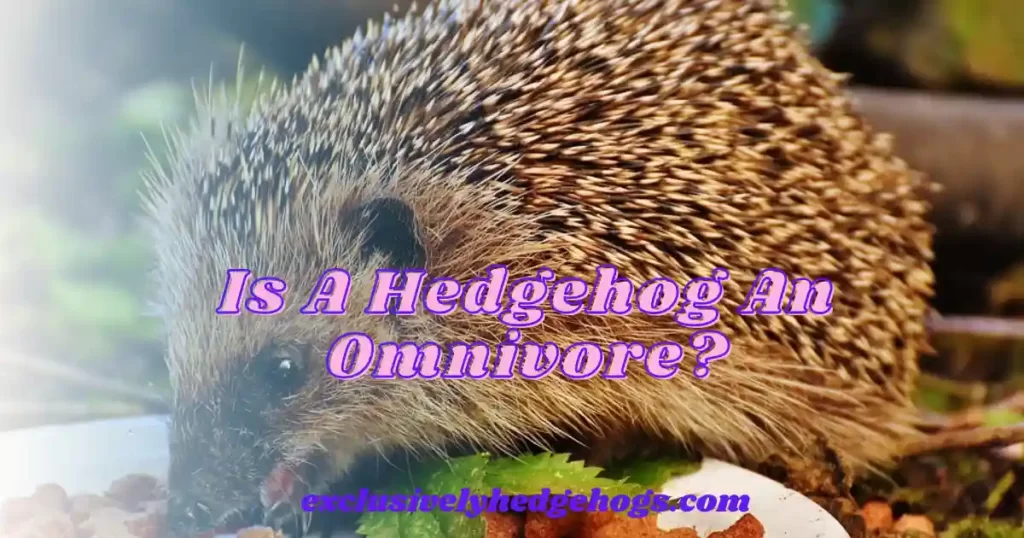Welcome, dear readers, to the curious world of hedgehog dietary habits! Prepare to have your preconceptions challenged as we explore whether hedgehogs are true omnivores or if they lean more towards a carnivorous lifestyle. Get ready for some foodie fun as we dive into the delicious details of what these spiky creatures like to munch on!
Is a Hedgehog an Omnivore or Carnivorous?
Now, this is where it gets interesting! Hedgehogs are often described as omnivores, meaning they have the ability to consume both plant matter and meat. However, their diet tends to lean more towards the carnivorous side. While they do consume some plant material, the majority of their diet consists of insects, worms, and other small invertebrates. So, you could say that hedgehogs are more like “carnivorous with a side of veggies”!

Are All Hedgehogs Omnivores?
Yes and no! While hedgehogs, as a species, are considered omnivorous, individual preferences can vary. Some hedgehogs may have a stronger inclination towards meat and insects, while others may show a greater fondness for fruits and vegetables. Just like us humans, hedgehogs have their own unique tastes and dietary preferences. So, the answer is a delightful mix of yes, no, and it depends on the hedgehog!
Does a Hedgehog Eat Meat?
Absolutely! Meat is a significant part of a hedgehog’s diet. In the wild, hedgehogs are skilled hunters, using their sharp teeth to catch and devour insects, worms, snails, and even small reptiles. So, if you ever stumble upon a hedgehog on a midnight prowl, don’t be surprised if you witness a gourmet feast of tasty critters!
What Foods Can Hedgehogs Eat?
When it comes to food, hedgehogs enjoy a diverse menu. Here are some of the delectable treats you can offer your spiky friend:
- Insects: Hedgehogs have a special affinity for insects like mealworms, crickets, and beetles. It’s like their version of a fancy Michelin-starred meal!
- Worms: Earthworms are a hedgehog delicacy. It’s their version of spaghetti – wriggly and delicious!
- Fruits: Hedgehogs have a sweet tooth and enjoy fruits like apples, pears, and berries. They’re nature’s little dessert enthusiasts!
- Veggies: While hedgehogs may not go crazy for veggies, they do appreciate the occasional treat of vegetables like carrots, peas, and green beans.
- Meat-based pet food: As carnivores at heart, hedgehogs can also enjoy specially formulated meat-based cat or dog food as part of their diet.
Do Hedgehogs Eat Mice?
No, mice are not a typical part of a hedgehog’s diet. While hedgehogs are skilled hunters, their prey usually consists of smaller creatures such as insects, worms, and snails. So, if you have a mouse problem, it’s best to call in a different kind of critter catcher!
What Do Hedgehogs Not Like to Eat?
Despite their diverse palate, hedgehogs do have some food preferences and dislikes. Here are a few things that hedgehogs tend to turn their noses up at:
- Citrus fruits: Hedgehogs are not fans of citrus fruits like oranges and lemons. They prefer their fruits without a tangy twist!
- Onions and garlic: These savory ingredients may add flavor to our dishes, but hedgehogs find them unappetizing. They like to keep their breath fresh!
- Spicy foods: Hedgehogs are not into spicy cuisine. They prefer their meals without the fiery kick!
- Dairy products: Hedgehogs are lactose intolerant, so they should avoid dairy products like milk and cheese. No cheesy hedgehogs allowed!
What Do Hedgehogs Drink?
Just like any other living creature, hedgehogs need to stay hydrated. They primarily drink water, and it’s essential to provide them with a fresh and clean water source. A shallow dish of water placed in their enclosure or habitat will do the trick. Hedgehogs are not known for their skills in mixology, so there’s no need to worry about them requesting a fancy cocktail!
Conclusion
So, there you have it, folks – the fascinating culinary world of hedgehogs! While they are technically omnivores, hedgehogs tend to lean more towards a carnivorous diet, relishing the taste of insects, worms, and other small invertebrates. They do enjoy some plant-based treats like fruits and veggies, but their carnivorous instincts are strong. Just remember, the key to keeping a happy and healthy hedgehog is to offer them a balanced diet that satisfies their nutritional needs. Bon appétit, hedgehogs!

